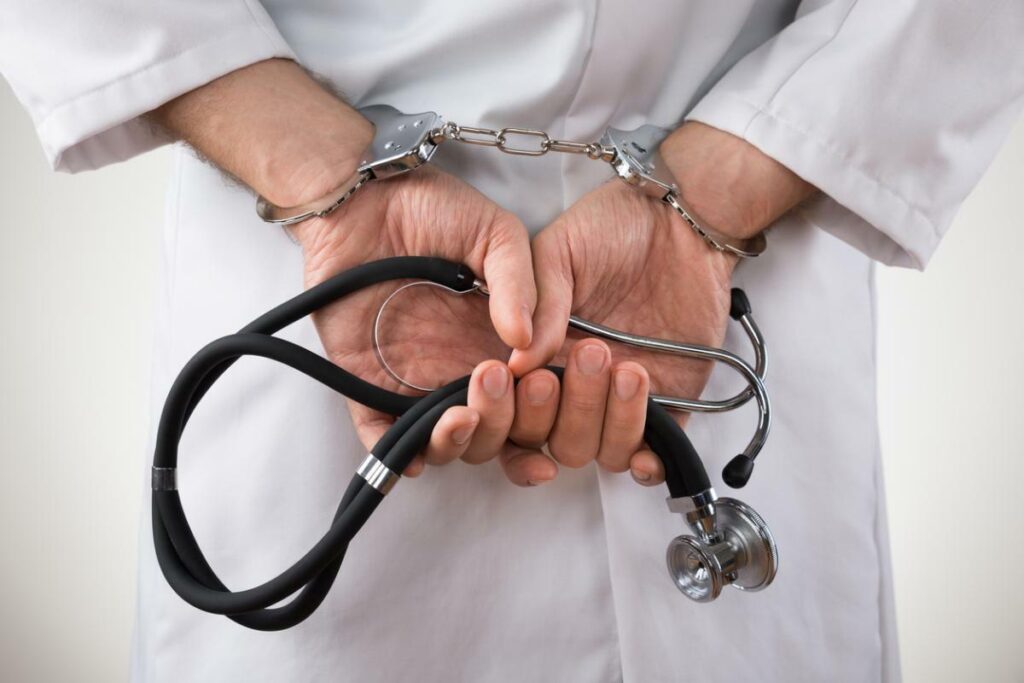If you become involved in or are accused of criminal activity, you may need to self-report the incident to the Texas Medical Board (TMB) in some instances. Engaging the services of an experienced medical license defense attorney from the beginning of your legal issues may allow you to reach a better result in your case. Your attorney can analyze your situation and determine whether self-reporting is required in your case.
Whether self-reporting is mandatory in your case or not, your first response to potential disciplinary proceedings before the TMB should be to contact an attorney quickly to be prepared to respond promptly and effectively. We can ensure you know what to expect if you face disciplinary proceedings and strategize how to defend you against potential criminal charges. Together, we can determine the best means of minimizing the impact of disciplinary proceedings on your career.
Reporting Arrests and Criminal Activity to the TMB
Whether you must report an arrest to the TMB depends on the circumstances surrounding the arrest and the nature of the alleged criminal offense. Unfortunately, many license holders make the mistake of reporting the arrest to the TMB when they are not required to, which can cause unwanted and unnecessary disciplinary proceedings. In other cases, individuals fail to report arrests or incidents involving criminal activity that they must report, which violates the rules and laws that govern their profession. Failing to report an arrest or criminal incident could constitute an aggravating factor that worsens your situation in any subsequent disciplinary proceedings that you may face.
Arrests for Felonies and Selected Criminal Offenses
Under 22 Tex. Admin. Code Sec. 190.8(2)(R), arrests and/or criminal activity may constitute unprofessional and dishonorable conduct in violation of the Texas Medical Practice Act (“the Act”) if substantiated by credible evidence. Unprofessional and dishonorable conduct is that which is likely to deceive, defraud, or injure the public within the meaning of the Act. This conduct includes, but is not limited to, the following:
- any felony;
- any offense in which assault or battery, or the attempt of either, is an essential element;
- any criminal violation of the Act or other statutes regulating or about the practice of medicine;
- any criminal violation of statutes regulating other professions in the healing arts that the licensee is licensed in;
- any misdemeanor involving moral turpitude as defined by paragraph (6) of this section;
- bribery or corrupt influence;
- burglary;
- child molestation;
- kidnapping or false imprisonment;
- obstruction of governmental operations;
- public indecency; and
- substance abuse or substance diversion.
Mere arrests for these incidents can be sufficient to result in disciplinary action against your license by the TMB, as there is no requirement that there be a complaint, indictment, or conviction. Disciplinary action can be based on a conviction, deferred adjudication, community supervision, or deferred disposition for any felony or any misdemeanor involving moral turpitude.
As a result, if you are arrested for any of the criminal offenses listed above, particularly any felony offense, it is likely that self-reporting an arrest is in your best interest. Self-reporting may be a mitigating factor that will benefit you in any ensuing disciplinary proceedings. On the other hand, failing to report an arrest involving this type of criminal activity could be an aggravating factor that could increase any potential sanctions that you receive.
Arrests for Misdemeanor Criminal Offenses
However, the Act does not authorize disciplinary action against licensed professionals for misdemeanor criminal offenses other than those that involve moral turpitude and that directly relate to the duties and responsibilities of the practice of medicine. 22 Tex. Admin. Code Sec. 190.8(6)(C) defines misdemeanors involving moral turpitude as those that:
- have been found by Texas state courts to be misdemeanors of moral turpitude;
- involve dishonesty, fraud, deceit, misrepresentation, violence; or
- reflect adversely on a licensee’s honesty, trustworthiness, or fitness to practice under the scope of the person’s license.
Misdemeanors are considered to directly relate to the duties and responsibilities of practicing medicine if they:
- arose out of the practice of medicine, as defined by the Act;
- arose out of the practice location of the physician;
- involve a patient or former patient;
- involve any other health professional with whom the physician has or has had a professional relationship;
- involve the prescribing, sale, distribution, or use of any dangerous drug or controlled substance; or
- involve the billing for or any financial arrangement regarding any medical service.
Determining whether a misdemeanor arrest is for a crime of moral turpitude or directly relates to the practice of medicine is not always straightforward. This determination is likely to directly affect whether you should self-report your arrest to the TMB. Whether you properly self-report an arrest or incident that could lead to criminal charges can have a bearing on the outcome of any sanctions you may receive from any resulting disciplinary actions. As a result, consulting an experienced license defense attorney to navigate this situation is a wise strategy.
Conclusion
The process of reporting arrests or criminal activity to the Texas Medical Board (TMB) and navigating potential disciplinary proceedings underscores the importance of proactive legal counsel. Whether mandated by law or not, self-reporting incidents to the TMB demands a nuanced understanding of regulations and potential ramifications. Failure to report when required or reporting unnecessarily can adversely affect your professional standing. Understanding the gravity of misdemeanor and felony charges, particularly those involving moral turpitude, is essential in determining the appropriate course of action. Given the complexities involved, seeking the guidance of an experienced medical license defense attorney early in the process is crucial. With their expertise, they can analyze the circumstances, advise on self-reporting obligations, and strategize for potential disciplinary proceedings. Ultimately, their support can be instrumental in safeguarding your professional reputation and minimizing the impact of any legal challenges on your career trajectory.
Click to contact our professional license defense lawyers today
Count on Bertolino LLP to Protect Your Medical License Throughout Your Disciplinary Proceeding
A disciplinary investigation, proceedings before the TMB, and potential sanctions will likely be stressful experiences. These proceedings can endanger your ability to work and support yourself. Only an experienced medical license defense lawyer can offer you the guidance you need. Contact us today by calling the offices of Bertolino LLP at (512) 515-9518 or visiting us online.
Call or text (512) 476-5757 or complete a Case Evaluation form






